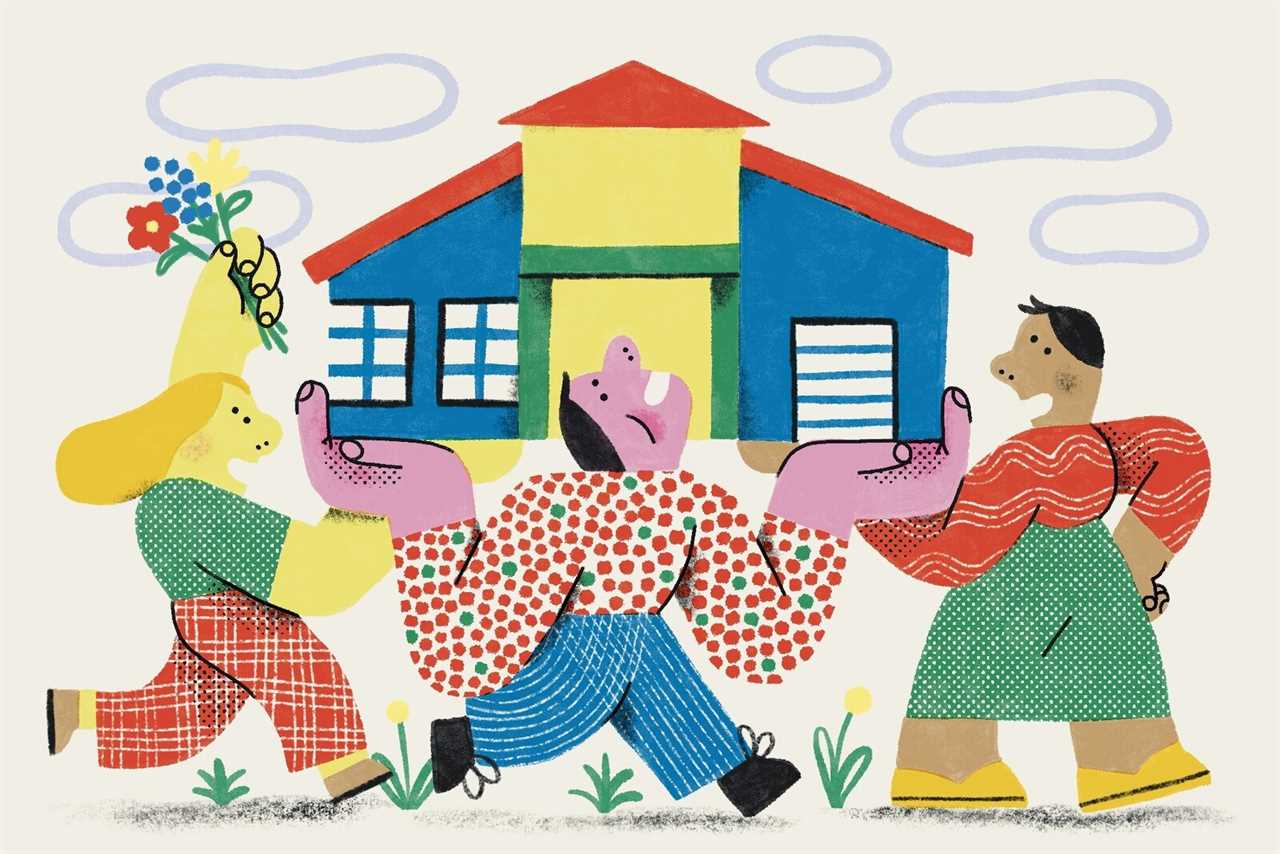"We sat down and said, Okay, if this is something we want to do, we’re going to need to get really comfortable talking about finances."

Throughout pandemic lockdowns, longtime friends Emily Winter and Kerry Couch would take early morning walks together through Chicago’s Logan Square neighborhood. On one occasion, they passed by a farmhouse-style home on a double-wide lot and started to play a game, pretending that they were the soon-to-be-owners: One would point out where the greenhouse and picnic table would go; they joked about who would live upstairs or downstairs. It’s a common fantasy played out by renters who hope to someday own a house, but for Winter, a textile weaver who teaches adult and college classes, and Couch, who owns a cafe, being able to afford a home was just that—a fantasy. And yet the two kept talking about it, dreaming of their shared garden.
"Neither of us could have afforded a house on our own," she explains. "Through a series of evolving conversations, we realized that our desires were lining up nicely."
Could two friends—people who are unrelated and not romantically involved—buy a house together?
The answer they’d soon discover is, actually, yes. Cooperative home buying is nothing new, especially in Chicago, where housing co-ops have been around since the 1920s. More often they are larger multifamily buildings; buying a single-family home or two-flat is typically reserved for a single buyer, such as a nuclear family or a potential landlord looking to rent out units. But for those whose incomes aren’t keeping up with purchasing costs or whose careers (and savings) were stunted by the Great Recession, cooperative buying offers a solution to the difficult problem of financing a first-time home purchase, as well as splitting maintenance and mortgage costs when interest rates are higher than they’ve been in nearly 20 years.
Winter and Couch were led through their buying process by realtor Susannah Ribstein at Living Room Realty, a real estate brokerage that provides free, public classes on cooperative buying. They’ve been running the classes for 10 years, says Ribstein, and the audience has evolved: A decade ago many cooperative buyers were looking to set up larger scale multifamily co-ops or create what might be called intentional living communities.
"It’s now a way for property ownership to be more accessible, and that’s what’s appealing about it," Ribstein says. "We want to provide people with information about all of the many ways that they can own property, and it doesn’t have to be the one way that many people think of it."
"We sat down and said, Okay, if this is something we want to do, we’re going to need to get really comfortable talking about finances."
Teagan Walsh-Davis, a manager at a software company, bought a two-flat on Chicago’s far north side with her closest friends, Damon and Liz (a couple), in 2021. Both Walsh-Davis and the couple had explored buying separately, but neither could afford a single-family house nor particularly wanted to live in a condo. Working instead as a group, they explored specific desires: The three have art practices that require space, the couple wanted to have kids, and all wanted to be close to a park. "We were talking to our realtor, and she said, ‘Based on what you need, there are eight properties in the city,’" Walsh-Davis says. "In some ways it was helpful for us because we weren’t having to think about a massive list of pros and cons between thirty or forty different buildings." They settled on their two-flat because it was in their price range, is near one of the city’s largest parks, and has an unfinished basement where the three practice pottery and screen printing.
Most important to the buying process, Walsh-Davis says, wasn’t picking out their favorite home but was creating a process to discuss their finances. "We sat down and said, Okay, if this is something we want to do, we’re going to need to get really comfortable talking about finances and about what we’re comfortable with and how we want to handle shared responsibilities versus individual responsibilities."
Setting up these types of conversations and establishing financial parameters—otherwise known as an operating agreement—is essential to cooperative buying, says president of Reside Home Loans Ben DeBoer, a mortgage broker who has advised dozens of cooperative sales. "An operating agreement sets up how they’re going to run the property: how they are going to claim any tax exemptions, how they will deal with expenses and maintenance, what happens if someone wants to exit," he explains.
"I think it is definitely going to continue to be a bigger thing, not just because of the financial need but also because of the need that people instinctively have for community."
Chuck McKeever is currently in the process of buying property with his wife and another couple in Detroit. It hasn’t been easy, he says, as each individual involved has their own challenges that make it less likely to get a mortgage—McKeever is a graduate student, another individual is self-employed—but dealing with financing frustrations made it easier to speak openly about money, he says. "There’s a reason we’re doing it with [this couple] and not any two other of our really good friends…I think we’ve gotten to a good place where we are able to talk pretty honestly about individual financial situations, our financial situations as a couple, and are all on board."
Through such transparent income conversations and agreements, DeBoer says that buying cooperatively can alleviate the financial issues McKeever and many other self-employed or underpaid millennials and Gen Zers struggle with when it comes to qualifying for a mortgage: If one buyer is self-employed and writes off every penny of their income, buying alongside others who have salaries, "mitigates the fact that that one person doesn’t have any qualifiable income, from the bank’s perspective. And now maybe we can still qualify because we have the other two," he explains.
Addressing maintenance, many of the cooperative buyers I spoke with described creating systems for tracking expenses, opening shared checking and savings accounts, and establishing clear rules. Walsh-Davis notes she paid for her kitchen renovation but split the cost of basement electrical work; David Plent, an architect in Baltimore who cooperatively bought a single-family row house with a friend and coworker, chipped in on a bathroom renovation. Though it wasn’t a shared space, the shower was leaking, and he happily split the repair fee while his housemate paid to upgrade to a bathtub.
But beyond cooperative buying’s financial or material benefits—which DeBoer says is a major reason he’s seeing an uptick of interested buyer groups—living cooperatively with friends provides community. "I think it is definitely going to continue to be a bigger thing, not just because of the financial need but also because of the need that people instinctively have for community," Walsh-Davis explains. "We decided to do this in the middle of Covid when we were all feeling very isolated, and I just wanted to have the people that I care about the most in my house." Winter, who closed with her friend on a subdivided bungalow in 2022, sees cooperative buying similarly. "On a non-financial level I really appreciate having a solid and more dispersed community network that’s established in different ways," she says. "Having a house partner, which is different from a romantic partner and different from a work partner—it’s just another way of strengthening your position in life."
Related reading:
Who Is Optimistic About Buying a Home? Not Younger Americans
30 Families Wanted to Build a Home Together. Two Architects Tell Us How They Made It Happen
Read More
By: Anjulie Rao
Title: Faced With Impossible Home Costs, Millennials and Gen Zers Are Buying With Friends
Sourced From: www.dwell.com/article/cooperative-home-buying-with-friends-4bf90526
Published Date: Tue, 21 May 2024 20:49:04 GMT
Did you miss our previous article...
https://trendinginbusiness.business/real-estate/nafs-reverse-division-looks-to-tell-new-product-stories-with-old-wives
.png)





